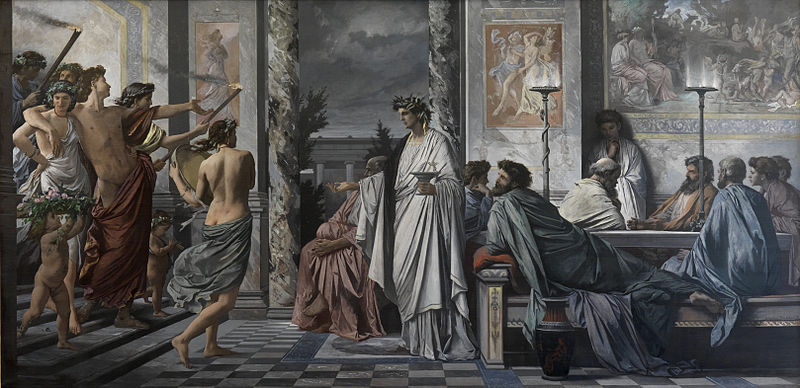Alongside research and teaching, most tenure-track jobs come with some expectation of service.


Alongside research and teaching, most tenure-track jobs come with some expectation of service.

If you’ve written a guest post for the Duck of Minerva recently, or published a piece at International Studies Quarterly while I was editor, you know that I really hate “heavy noun phrases.” Scholars seem to really like using them. I don’t know why. Perhaps they think it makes their writing sound more sophisticated. There’s an article at PS which is good at diagnosing the problem (but offers bad fixes).

The way that APSA leaders handled the Claremont Institute situation was troubling… will APSA, as an organization, be committed to some broadly liberal democratic values?

So the New York Times reported on Beverly Gage, a history professor at Yale University, resigning from her post as head of the Brady-Johnson Program in Grand Strategy because of donor pressure....
Today, I learned that I am out of touch. Ok, that is old news. I got into a twitter conversation about embargoed dissertations. A friend was trying to access and then cite a dissertation that has been out for a few years, and she could not because the dissertation was embargoed. I then raised this on twitter, and got a whole lot of push back. So, let's take a look at this. My basic take is that a dissertation is a contribution to knowledge, and our job is to not only create such knowledge but to share it. I also argued that it is counter-productive to one's career as it makes it hard for...

This is a guest post from Cullen Hendrix, Director of the Sié Chéou-Kang Center for International Security and Diplomacy and Professor at the Korbel School of International Studies, University of Denver. International relations and international security scholarship have a U.S. bias problem—or so we are told. Ido Oren has argued the modern discipline of political science generally—and international relations specifically—was shaped by U.S. economic and security interests during the World Wars and the Cold War. Writing in the 1970s, E.H. Carr went so far as to say “the study of international...
This is a guest post by Linda Monsees who works as a Post-Doctoral Researcher at Goethe University Frankfurt and is the author of Crypto-Politics. After wars on drugs, Christmas and everything in between, it seems that we people tend to call everything a war – everything despite a real war. But really, we are now in a ‘war on truth’? Politicians, companies, and countries start disinformation campaigns and lots of stories are shared that do not qualify as journalism. And this spread of fake news got us in a ‘war’? I get it, we are still in the process of overcoming the shocks of certain...
Sorry, clickbait! But admit, it, after an apology of race science in Quillette or “The Case for Colonialism” in TWQ you probably rage-clicked on the thumbnail to let me have it. Periodic IR Twitter flares over teaching "Stoddard light" (i.e., Huntington) also show that not all scholars are aware of racialized origins of world order, existing color lines in global capitalism, or even “race relations” pedigree of IR as a discipline. This post is about a case for teaching about nationalism because it seems like different versions of racist primordial rhetoric just won’t die. As a blog post by...
Here’s my argument: Late 80s/early 90s Soviet Union. The United Kingdom in 2016. The United States 2016 to now. Three contemporary examples of international suicide that conventional IR neither predicted nor can account. Ok, so perhaps suicide is too hyperbolic a concept and we should go with appetite for self-destruction . Certainly in the case of the Soviet Union any agential claim regarding the state is overdrawn. But either way I think there is a point here. All three states, and particularly the last two, undertook an internally driven diminution of international standing and...

I assigned Plato’s Theaetetus this semester in my foreign policy class. It was the very first thing we read in a course that included more standard text’s like Walter Russel Mead’s Special Providence, Tom Schelling’s Arms and Influence, and selections from Andrew Bacevich’s edited volume of primary sources, Ideas and American Foreign Policy. On first glance, reading a work of political philosophy—and one which is widely considered one of the more difficult texts in the Western canon—might seem like a poor fit. But, my experiment paid off and I may continue assigning the Theaetetus or similar...
An amazing series of tweets must be re-posted here so that IR profs everywhere can use them for syllabi and for the first day of class. A grateful nation owes Herb Carmen, former naval aviator, a tremendous debt. Casual vs. Causal pic.twitter.com/3N2ftzChkf — Herbal (@HerbCarmen) April 5, 2019 Boarder vs. Border pic.twitter.com/8U3OU7pibl — Herbal (@HerbCarmen) April 5, 2019 Loose vs. Lose pic.twitter.com/qrJ4Z4cJt9— Herbal (@HerbCarmen) April 5, 2019 And for all profs: It's vs Its pic.twitter.com/7jk7lzNk0G — Herbal (@HerbCarmen) April 5, 2019

It's happened to all of us (or least those of us who do quantitative work). You get back a manuscript from a journal and it's an R&R. Your excitement quickly fades when you start reading the comments. One reviewer gives a grocery list of additional tests they'd like to see: alternate control variables, different estimators, excluded observations. Another complains about the long list of robustness checks already in the manuscript, as it obscures the important findings. Sometimes both of these reviewers are the same person. And it gets even more complicated if the article ends up rejected...